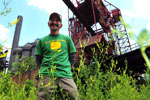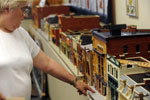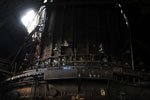
Historical Societies Foster Pride and Preservation
By Matthew Santoni
PITTSBURGH TRIBUNE-REVIEW
Thursday, June 10, 2010

Ronald A. Baraff, director of museums and archives for the Rivers of Steel Heritage Area, which chronicles the history and culture of the industries and mill towns along the rivers, visits the former Carrie Furnace steel mill site in Braddock. Rivers of Steel recently acquired the site from the county to turn into a museum. Sidney Davis | Tribune-Review
The statue of Pittsburgh Pirates legend Honus Wagner might stand outside PNC Park on the North Shore, but fans who desire something more can head six miles down the Parkway West to the Historical Society of Carnegie’s miniature museum to learn about its native son.
In a historic building along West Main Street, a small exhibit on Wagner shares space with yearbooks and photos from area schools, a memorial wall for the town’s military veterans, and a painstakingly crafted scale model of the borough’s buildings along East and West Main Street, all funded without help from the municipality.

Volunteer Joan Harbin points out a model of the building housing the artifacts and exhibits on display at the Historical Society of Carnegie in the small museum on West Main Street. Keeping up with the maintenance of the building and expansion plans has been a struggle, but officials say local history groups, such as the Carnegie's, help to instill local pride and encourage tourism and redevelopment. James Knox | Tribune-Review
“We support ourselves. We figured it was better to be people-funded rather than tax-funded,” said Marcella McGrogan, executive director of the society. “Our town’s streets and parking lots need the help more than we do.”
Carnegie is one of many communities in the region with a historical society, which officials say can encourage economic development by drawing tourists, instilling local pride and marketing a community’s historic assets.
“We have a ‘Babushkas and Hardhats’ tour … that looks at the development of the Pittsburgh region, why industry located here, why it isn’t here now and how Pittsburgh has reinvented itself,” said Ron Baraff, director of museums and archives for the Rivers of Steel Heritage Area, which chronicles the history and culture of the industries and mill towns along the rivers.

About 15 acres of the former Carrie Furnace steel mill site in Rankin and Braddock were transferred from the county to Rivers of Steel, and officials hope to turn the former blast furnaces into a museum. Sidney L. Davis | Tribune-Review
About 15 acres of the former Carrie Furnace steel mill site in Rankin and Braddock were transferred from the county to Rivers of Steel, and officials hope to turn the former blast furnaces into a museum.
“The idea is to bring people into the region and get them to understand that the past built the present, that that’s the foundation for the future,” he said.
How and why it helps
The Young Preservationists Society of Pittsburgh released a report last month estimating that preserving and restoring historic properties added at least $475 million to Southwestern Pennsylvania’s economy from 2003 to 2009. Local historical societies can encourage such redevelopment and reinvestment by making people more aware of the history of their communities and homes, said Arthur Ziegler, president of the Pittsburgh History and Landmarks Foundation.
“People tend to believe in the value of that area and are more willing to invest, particularly in historic buildings,” Ziegler said. “It can also develop visitor interest, which can bring income to a town.”
The Sewickley Valley Historical Society is too small to maintain a museum space of its own, but its library allows people to research the history of their families or their homes, said Harton Semple, executive director.
“We’re a small society — only about 400 members — but we have a rich history to draw upon,” Semple said. “We are assailed on all sides by development and general apathy, but we’re beating back that tide.”
The Sewickley Valley society’s “nest egg” was hit hard by the recession, but it has sustained itself with members who made donations above and beyond their yearly membership dues, Semple said. The group published a history of Sewickley last year, and is beginning a push to fund and erect historical markers around the area, he said.
The Historical Society of Mt. Lebanon charges a small fee for its “home history project,” which presents homeowners with a report on the architect who designed their houses, construction plans for them and any other tidbits that members of the historical society can dig up, said Executive Director Margaret Jackson.
Mt. Lebanon’s society is entering its second year of operating a small museum space off Washington Avenue, which hosts rotating exhibits on local subjects such as the nearby Washington School or the Mt. Lebanon Soccer League, Jackson said. More and more residents are donating artifacts and photographs, but that raises the new challenge of how to store and protect them all. Yearly contributions from the municipality’s budget are enough to cover rent on the museum space, she said.
“We’re slowly getting the word out that we’re here, that we’re not just for little old ladies,” Jackson said. “Mt. Lebanon is just celebrating our centennial. … Hopefully, we’ll preserve our community’s past for decades to come.”
The Westmoreland County Historical Society this week moved its library and museum space to a new location on Sand Hill Road, which is more accessible to the many people who use its archives to research their family’s past, said Executive Director Lisa Hays.
“What’s surprising is how far people will travel to study their genealogy. … We had people come from as far away as Australia last week,” Hays said. “Typically, one person will sit and do research while the rest of the family goes out and sees the local sights.”
Hays said local societies help residents understand their communities’ place in the larger events of history, and knowing what roles they played or how they were affected can foster civic pride.
“Everyone thinks nothing ever happened in their backyard, but it did — everything that’s happened on a national level, on a world level, was played out on a local level,” she said. “Once that dawns on people, it creates a real sense of local pride.”
